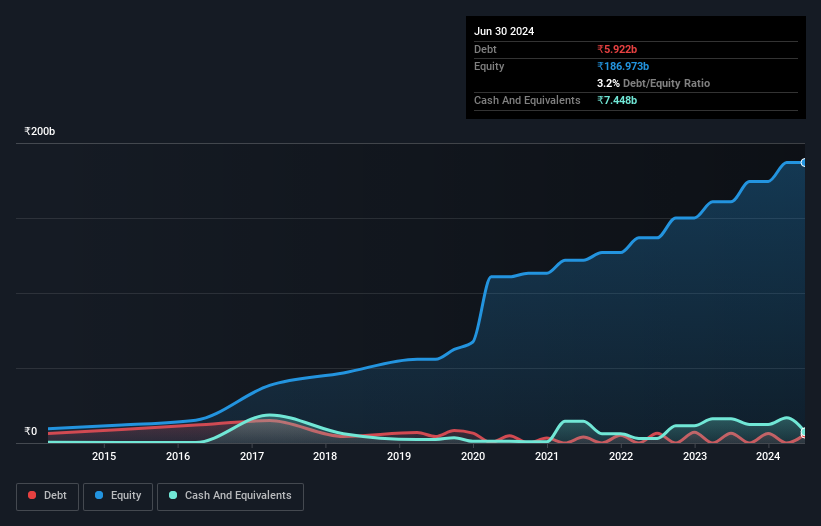Warren Buffett famously said, 'Volatility is far from synonymous with risk.' When we think about how risky a company is, we always like to look at its use of debt, since debt overload can lead to ruin. As with many other companies Avenue Supermarts Limited (NSE:DMART) makes use of debt. But should shareholders be worried about its use of debt?
When Is Debt A Problem?
Debt is a tool to help businesses grow, but if a business is incapable of paying off its lenders, then it exists at their mercy. Part and parcel of capitalism is the process of 'creative destruction' where failed businesses are mercilessly liquidated by their bankers. However, a more common (but still painful) scenario is that it has to raise new equity capital at a low price, thus permanently diluting shareholders. By replacing dilution, though, debt can be an extremely good tool for businesses that need capital to invest in growth at high rates of return. The first step when considering a company's debt levels is to consider its cash and debt together.
See our latest analysis for Avenue Supermarts
How Much Debt Does Avenue Supermarts Carry?
You can click the graphic below for the historical numbers, but it shows that Avenue Supermarts had ₹5.92b of debt in March 2024, down from ₹6.43b, one year before. However, it does have ₹7.45b in cash offsetting this, leading to net cash of ₹1.53b.

How Healthy Is Avenue Supermarts' Balance Sheet?
According to the last reported balance sheet, Avenue Supermarts had liabilities of ₹19.8b due within 12 months, and liabilities of ₹5.01b due beyond 12 months. Offsetting these obligations, it had cash of ₹7.45b as well as receivables valued at ₹2.10b due within 12 months. So its liabilities outweigh the sum of its cash and (near-term) receivables by ₹15.3b.
Having regard to Avenue Supermarts' size, it seems that its liquid assets are well balanced with its total liabilities. So while it's hard to imagine that the ₹3.21t company is struggling for cash, we still think it's worth monitoring its balance sheet. Despite its noteworthy liabilities, Avenue Supermarts boasts net cash, so it's fair to say it does not have a heavy debt load!
And we also note warmly that Avenue Supermarts grew its EBIT by 17% last year, making its debt load easier to handle. There's no doubt that we learn most about debt from the balance sheet. But it is future earnings, more than anything, that will determine Avenue Supermarts's ability to maintain a healthy balance sheet going forward. So if you want to see what the professionals think, you might find this free report on analyst profit forecasts to be interesting.
Finally, a business needs free cash flow to pay off debt; accounting profits just don't cut it. While Avenue Supermarts has net cash on its balance sheet, it's still worth taking a look at its ability to convert earnings before interest and tax (EBIT) to free cash flow, to help us understand how quickly it is building (or eroding) that cash balance. Considering the last three years, Avenue Supermarts actually recorded a cash outflow, overall. Debt is far more risky for companies with unreliable free cash flow, so shareholders should be hoping that the past expenditure will produce free cash flow in the future.
Summing Up
While it is always sensible to look at a company's total liabilities, it is very reassuring that Avenue Supermarts has ₹1.53b in net cash. And it impressed us with its EBIT growth of 17% over the last year. So we don't have any problem with Avenue Supermarts's use of debt. The balance sheet is clearly the area to focus on when you are analysing debt. However, not all investment risk resides within the balance sheet - far from it. For example, we've discovered 1 warning sign for Avenue Supermarts that you should be aware of before investing here.
Of course, if you're the type of investor who prefers buying stocks without the burden of debt, then don't hesitate to discover our exclusive list of net cash growth stocks, today.
New: Manage All Your Stock Portfolios in One Place
We've created the ultimate portfolio companion for stock investors, and it's free.
• Connect an unlimited number of Portfolios and see your total in one currency
• Be alerted to new Warning Signs or Risks via email or mobile
• Track the Fair Value of your stocks
Have feedback on this article? Concerned about the content? Get in touch with us directly. Alternatively, email editorial-team (at) simplywallst.com.
This article by Simply Wall St is general in nature. We provide commentary based on historical data and analyst forecasts only using an unbiased methodology and our articles are not intended to be financial advice. It does not constitute a recommendation to buy or sell any stock, and does not take account of your objectives, or your financial situation. We aim to bring you long-term focused analysis driven by fundamental data. Note that our analysis may not factor in the latest price-sensitive company announcements or qualitative material. Simply Wall St has no position in any stocks mentioned.
About NSEI:DMART
Avenue Supermarts
Engages in the business of organized retail and operating supermarkets under the D-Mart brand name in India.
Excellent balance sheet with moderate growth potential.
Similar Companies
Market Insights
Community Narratives



